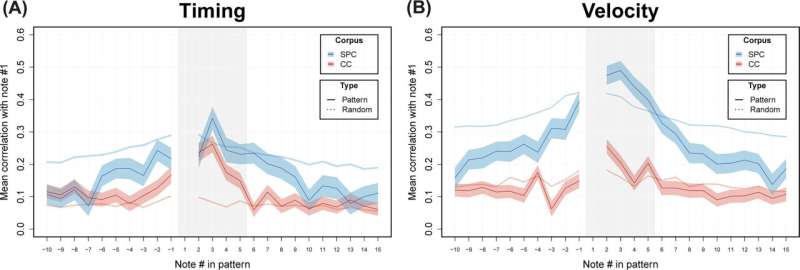
World-renowned jazz musicians are often praised for their creative ingenuity. But how do they make up improvisations? And what makes artists’ solos more enticing than those of less skilled players? These questions continue to puzzle not only jazz aficionados, but also psychological researchers.
Two leading theories have dominated so far: Either musicians learn to master rules telling them what they can and cannot play—a sort of “secret language of jazz.” Or, each musician builds up a personal library of melodic patterns—”licks”—that they can draw upon and recombine in new and interesting ways. Over the years, musical scholars have collected many such volumes of “licks” for learners to practice.
Yet, the fact that a certain combination of notes recurs many times is no proof of an underlying movement pattern stored in the brains of musicians—it could just be a sheer coincidence.
The ‘library theory’ of jazz improvisation
A new study, just published in the journal Cognition, provides the first solid psychological evidence for the library theory of jazz improvisation. For the first time ever, researchers from Aarhus University and Georgia State University found that expert jazz musicians play certain note combinations with much more consistent timing and force than others.
Regardless if these “licks” were played fast or slow, loud or soft, the relative rhythms and accents remained very similar. This strongly suggests that each player possesses a collection of patterns that are directly grounded in their own body and brain. Many jazz experts have called it their personal “vocabulary.” Interestingly, the new study found that these improvisation vocabularies vary between different players.
Martin Norgaard, born and raised in Denmark, now Associate Professor of Music Education at Geogia State University in Atlanta comments further: “It is fascinating that expert jazz musicians store linked audio and motor representations in the brain—that is both the sound of licks and information about how to play them. As a jazz violinist myself, I often hear licks I want to play while improvising but the motor representation is not complete so the lick doesn’t come out right. Based on our research, that should happen less as expertise develops.”
Stylistically appropriate and novel—hallmarks of creativity
Using an advanced computer model, the researchers furthermore showed that “licks” tend to occur in relatively predictable contexts but simultaneously evoke greater surprise and uncertainty in the listener.
This finding fits well with leading theories in psychology and neuroscience about human creativity and what makes certain types of music particularly enjoyable to listen to. Specifically, melodies in the personal vocabularies of jazz improvisers are typically both stylistically appropriate and novel—the two hallmarks of creativity according to scientists.
“The fact that the solos of jazz experts evoke strong expectations in listeners and simultaneously surprise them might be exactly what makes these melodies so catchy and memorable. This may ultimately help us understand why some musicians become famous while others don’t,” said senior author Niels Chr. Hansen, Assistant Professor at Aarhus Institute of Advanced Studies at Aarhus University, Denmark.
The research results—how did they do it?
- The researchers analyzed nearly 100,000 notes played on a MIDI keyboard by the artist-level jazz pianist Kevin Bales, during 11 live music gigs for audiences in the United States. This collection of solos was compared to recordings of 25 experienced jazz pianists taking part in a previous laboratory experiment.
- For each recurring 5-note sequence, the durations of notes and the force with which they were played were compared across versions of the same pattern to find the set of licks that were played the most consistently across different tempi and loudness.
- A computational model was trained on the Weimar Jazz Database consisting of more than 200,000 notes from 456 improvised songs by various jazz artists to estimate how much surprise and uncertainty each note in Kevin Bales’ improvised solos would evoke in an average jazz listener.
Source: Read Full Article
